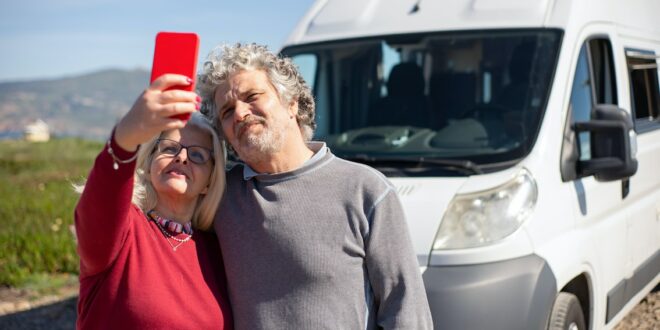Who hasn’t dreamt of upping sticks, not for just one different place, but for a life on the move! Becoming a national or an international-nomad is on the increase, and from the ‘Grey Nomads’ of Australia to the ‘Snowbirds’ of North America, seniors are embracing this exciting way of living life to the full. If you’re considering life as a senior nomad, check out our practical considerations, below. They’re just a sample of what you’ll need to investigate before deciding whether or not to ‘live your dream,’ but they’re enough to start an exciting ball rolling!
Consider this:
How well do you get along with yourself (or your partner, if you have one)? Being settled at home, with friends and family to visit and socialise with, is one thing, but a life on the road for singles can mean significant time spent alone. Are you up for it? If you plan to travel with your partner, it’s likely you’ll spend considerably more time together than you now do. How strong is your relationship? Will being together 24/7 be a good thing for both of you?
How long do plan to be ‘on the road?’ Leaving home on a one-way ticket can sound exciting, but the preparation required is significantly more than if you limit your travels to a defined period. Newbies to a nomadic lifestyle would do well to test-drive their dream with an extended holiday in their own country before planning too far in advance.
 Will you travel nationally or abroad? Travelling abroad for an extended period can affect your superannuation entitlement. You can check this out here (but always contact WINZ directly for updated information).
Will you travel nationally or abroad? Travelling abroad for an extended period can affect your superannuation entitlement. You can check this out here (but always contact WINZ directly for updated information).
Where will you stay? Whether it’s at home or abroad, the type of accommodation you have at your disposal will make a huge difference to your costs. Before you even think about budgets, check out options such as house sitting, home exchanging, and volunteering with accommodation.
Unfortunately, we can’t run away from health issues – our own or our partner’s. As much as you’d like to up sticks, is it going to be possible given your medical needs? Before you decide one way or another, check this out with your medical professional. There may be solutions you’ve never thought of which will enable you to travel and take care of your health.
Your home is usually considered your major asset. What will you do with it if you embrace a nomadic lifestyle? If you leave it empty, how will this affect its security (and your home insurances)? If you rent your home, the same questions apply, and you’ll also need to think about putting possessions into storage and finding a property manager.
Some long-term senior nomads divest themselves of all but their essential possessions, before they leave home. Does this sound like you – or is ‘burning your bridges’ a step too big to take?
If your vehicle isn’t coming on your adventure with you, where will you store it – or would it be better if it was sold?
How will you fund your nomadic adventures? If you plan to live on your savings and super, will these cover your outgoings? If you need to find work, have you checked out possibilities? If working will be important, have you updated your CV, gathered references, and requested a police check (always handy if you plan to work with children or as a carer).
Have you thought about ‘Plan B?’ Sometimes, dreams work out better than we could ever have hoped for, and sometimes, the lifestyle we’ve opted out of looks rosier from another perspective. If personal reasons mean you need to temporarily or permanently abandon your nomadic life style, do you have an accommodation option to return to? Do you have a nest egg you can rely on to see you through your change of plans?
Don’t let details discourage you, but when it comes to thinking ‘senior nomad,’ do be realistic about what’s achievable and what’s not. The above is not an exhaustive list of considerations. Read about seniors who are already leading a nomadic lifestyle, and learn from their experiences.










Join the Discussion
Type out your comment here:
You must be logged in to post a comment.